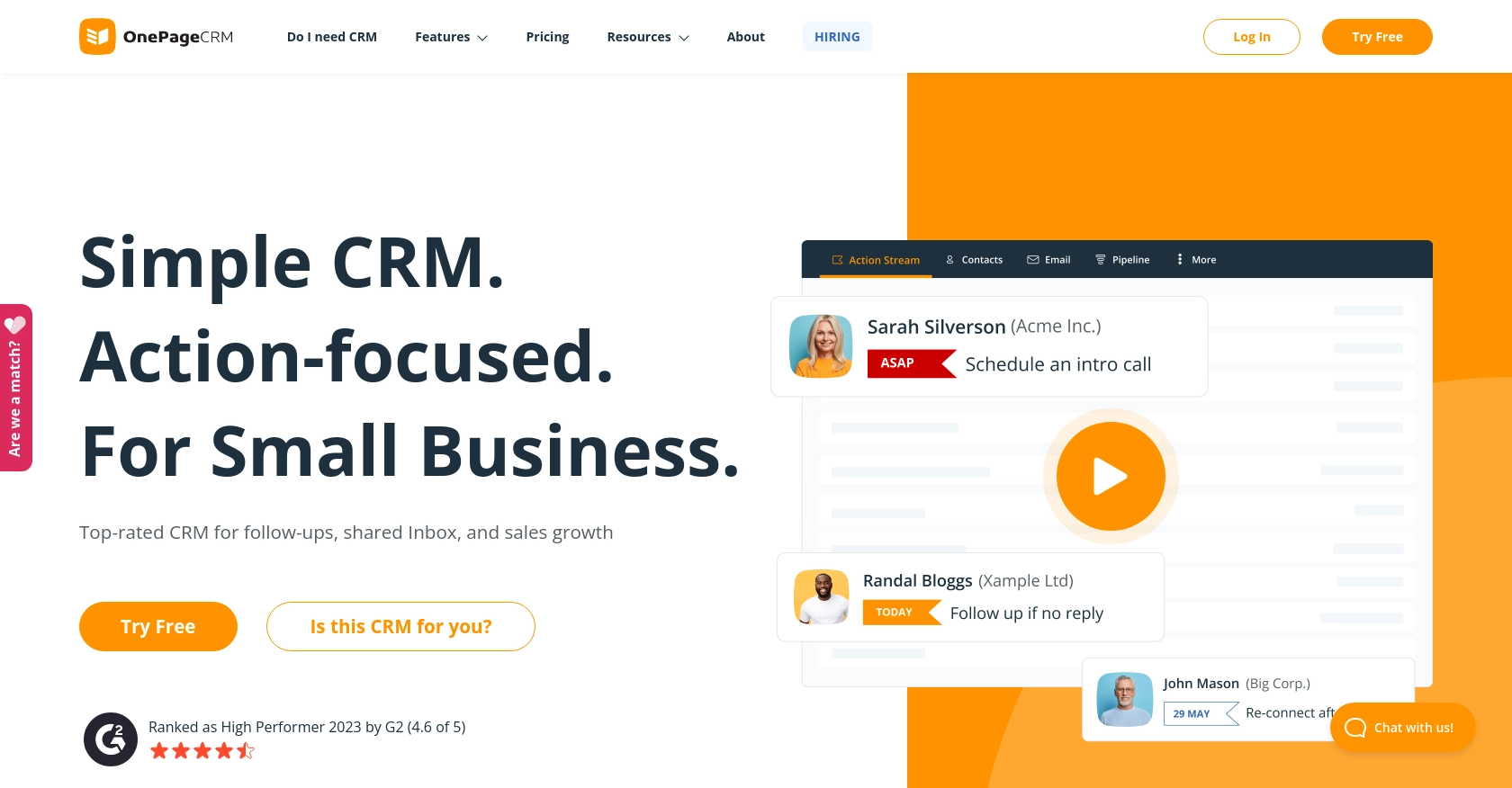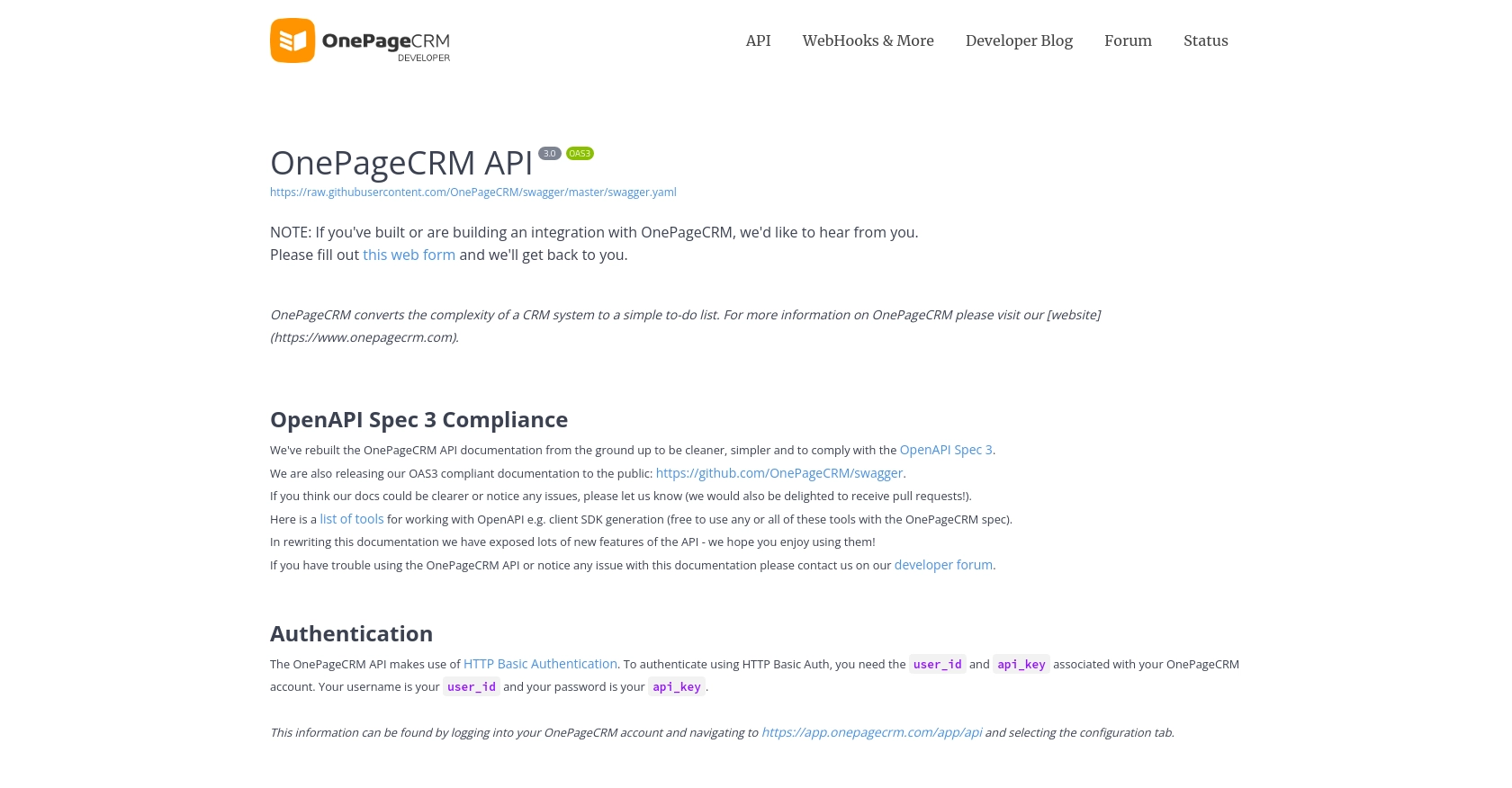Using the OnePageCRM API to Get Companies (with PHP examples)

Introduction to OnePageCRM
OnePageCRM is a dynamic customer relationship management platform designed to simplify sales processes for businesses. It offers a streamlined approach to managing contacts, deals, and tasks, making it an ideal choice for sales teams looking to enhance productivity and efficiency.
Integrating with OnePageCRM's API allows developers to access and manage company data seamlessly. For example, a developer might use the OnePageCRM API to retrieve a list of companies, enabling the automation of data synchronization between OnePageCRM and other business applications.
Setting Up Your OnePageCRM Test Account for API Integration
Before you can start interacting with the OnePageCRM API, you'll need to set up a test account. This will allow you to safely experiment with API calls without affecting live data.
Creating a OnePageCRM Account
If you don't already have a OnePageCRM account, you can sign up for a free trial on their website. This trial will give you access to all the features you need to test the API integration.
- Visit the OnePageCRM website and click on the "Free Trial" button.
- Fill out the registration form with your details and submit it.
- Once registered, log in to your OnePageCRM account.
Generating API Credentials for OnePageCRM
OnePageCRM uses a custom authentication method to secure API requests. Follow these steps to generate the necessary credentials:
- Navigate to the "Settings" section in your OnePageCRM dashboard.
- Find the "API & Integrations" tab and click on it.
- Under the API section, click on "Generate API Key" to create a new key.
- Copy the generated API key and keep it secure, as you'll need it to authenticate your API requests.
Configuring Your Development Environment
With your API key in hand, you can now configure your development environment to interact with the OnePageCRM API. Ensure you have the necessary tools and libraries installed for PHP development:
- Ensure PHP is installed on your machine. You can download it from the official PHP website.
- Install Composer, the PHP package manager, to manage dependencies.
- Use Composer to install any required libraries, such as Guzzle for making HTTP requests.
With your OnePageCRM account set up and your development environment configured, you're ready to start making API calls to retrieve company data.

sbb-itb-96038d7
Making API Calls to Retrieve Companies from OnePageCRM Using PHP
With your OnePageCRM account and API key ready, you can now proceed to make API calls to retrieve company data. This section will guide you through the process of setting up your PHP environment and executing the necessary API requests.
Setting Up Your PHP Environment for OnePageCRM API Integration
Before making API calls, ensure your PHP environment is correctly configured:
- Verify that PHP is installed on your system. You can download it from the official PHP website.
- Install Composer, the PHP dependency manager, to handle any required libraries.
- Use Composer to install Guzzle, a PHP HTTP client, which simplifies making HTTP requests:
composer require guzzlehttp/guzzleExecuting the OnePageCRM API Call to Retrieve Companies
With your environment set up, you can now write a PHP script to interact with the OnePageCRM API and retrieve a list of companies.
require 'vendor/autoload.php';
use GuzzleHttp\Client;
$client = new Client();
$apiKey = 'Your_API_Key';
$baseUrl = 'https://app.onepagecrm.com/api/v3/companies';
try {
$response = $client->request('GET', $baseUrl, [
'headers' => [
'Authorization' => 'Bearer ' . $apiKey,
'Accept' => 'application/json',
],
'query' => [
'sort_by' => 'name',
'order' => 'asc',
'page' => 1,
'per_page' => 10
]
]);
$companies = json_decode($response->getBody(), true);
foreach ($companies['data'] as $company) {
echo 'Company Name: ' . $company['name'] . "<br>";
}
} catch (Exception $e) {
echo 'Error: ' . $e->getMessage();
}Replace Your_API_Key with the API key you generated from your OnePageCRM account.
Understanding the API Response and Handling Errors
The API call returns a JSON response containing the list of companies. You can loop through this data to access individual company details. The response codes you might encounter include:
- 200 OK: The request was successful, and the companies' data is returned.
- 400 Bad Request: The request was malformed or contains invalid parameters.
- 401 Unauthorized: Authentication failed due to an invalid API key.
- 403 Forbidden: You do not have permission to access the resource.
- 404 Not Found: The requested resource could not be found.
- 409 Precondition Failed: The request could not be completed due to a conflict.
- 500 Internal Server Error: An error occurred on the server.
For more details, refer to the OnePageCRM API documentation.
Conclusion and Best Practices for Using OnePageCRM API with PHP
Integrating with the OnePageCRM API using PHP allows developers to efficiently manage and automate company data retrieval. By following the steps outlined in this guide, you can set up a seamless connection between your applications and OnePageCRM, enhancing your business processes.
Best Practices for Secure and Efficient API Integration
- Secure Storage of API Credentials: Always store your API keys securely, using environment variables or secure vaults, to prevent unauthorized access.
- Handle Rate Limiting: Be mindful of the API's rate limits to avoid service disruptions. Implement retry logic with exponential backoff to manage rate limit errors gracefully.
- Data Transformation and Standardization: Ensure that data retrieved from OnePageCRM is transformed and standardized to fit your application's requirements, maintaining consistency across systems.
- Error Handling: Implement robust error handling to manage different response codes effectively, ensuring your application can recover gracefully from API errors.
Enhance Your Integration Strategy with Endgrate
While integrating with OnePageCRM is a powerful way to streamline your sales processes, managing multiple integrations can be complex and time-consuming. Endgrate offers a unified API solution that simplifies the integration process across various platforms, including OnePageCRM.
By leveraging Endgrate, you can:
- Save time and resources by outsourcing integration management, allowing you to focus on your core product development.
- Build once for each use case, rather than developing separate integrations for different platforms.
- Provide an intuitive integration experience for your customers, enhancing user satisfaction and engagement.
Explore how Endgrate can transform your integration strategy by visiting Endgrate today.
Read More
Ready to get started?
